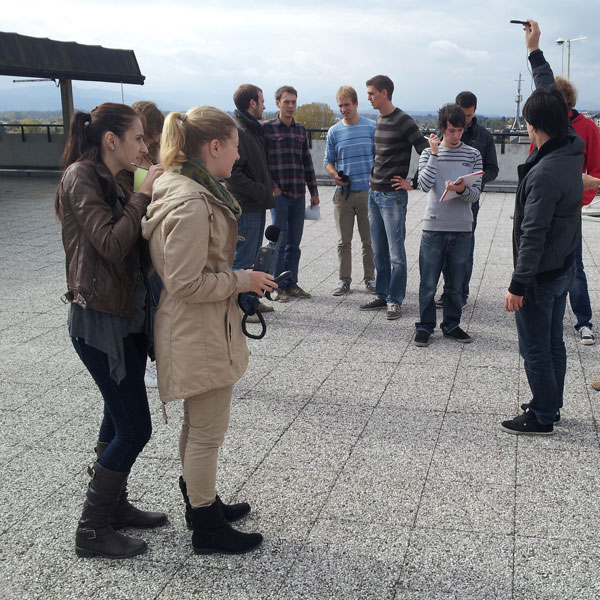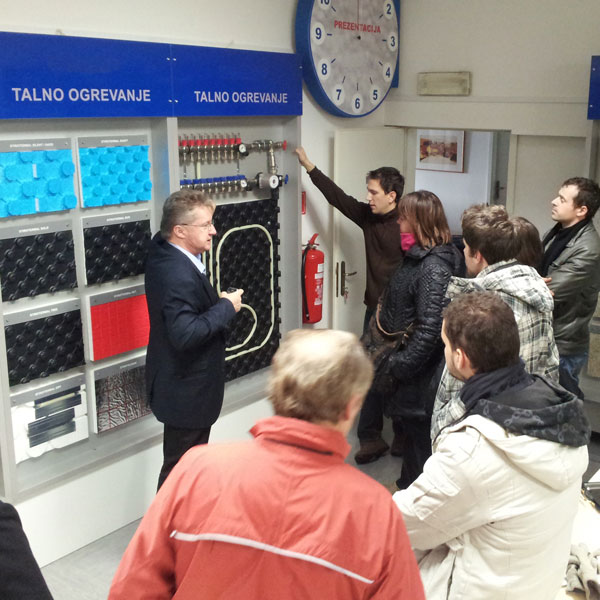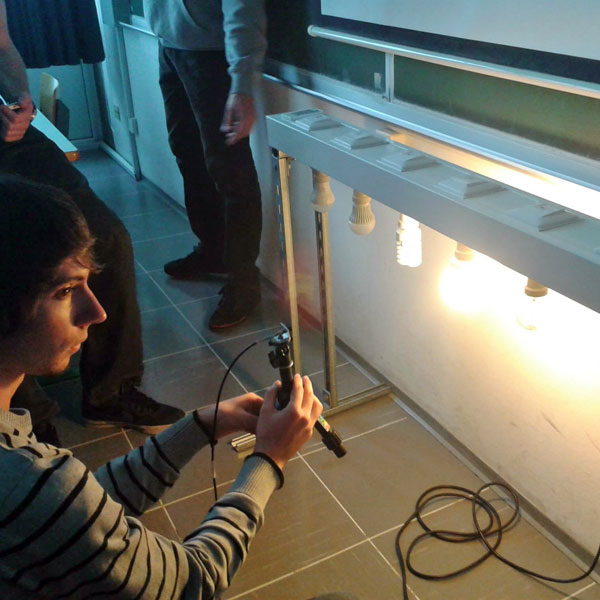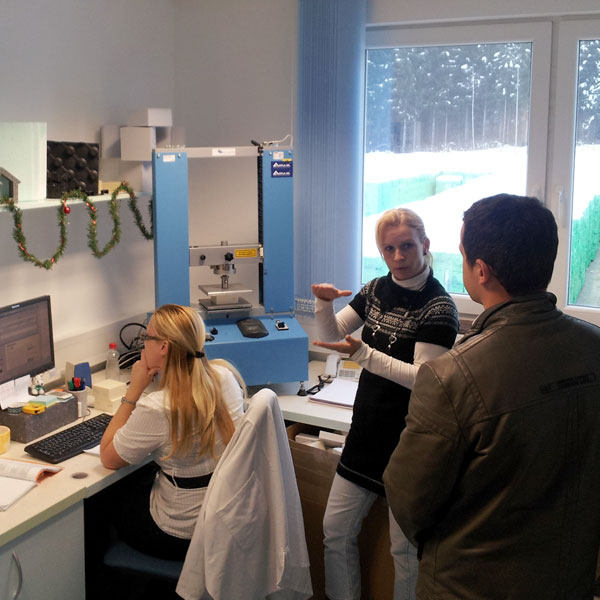
2nd Cycle: Buildings MA
The study program Buildings focuses on buildings – their design, construction, use and removal. In the existing education system of the University of Ljubljana two parts of construction area are well represented: the Faculty of Architectures is in charge of spatial planning (in our case inside buildings), whereas the Faculty of Civil and Geodetic Engineering is responsible for the design of load-carrying structures of buildings. Both programs lack contents from the design of »protective« structures that would essentially connect the bioclimatic design orientation with structural building physics.
Vitruvius was the father of the two thousand year old paradigm of sustainable buildings, defining essential properties of every building: utilitas – usefulness, rmitas – strength, and venustas – health, comfort, delight, joy. Several meanings of the last term confirm its special importance.
The study program Buildings is adapted to the needs and requirements of our dwelling and working environments. The basic condition and rule for the functioning of ecological systems is rationality and balance of their parts and complexes. The same is also true for socio-ecological system, part of which are also built environment and man. Architectonic artefact is an interface between natural environment and man-made environment. Building as part of the ecosystem that harmonizes different influences and conditions in the system using high technology, is the goal of all efforts of the contemporary bioclimatic design dealing with dwelling and living environment.
places for master study program Buildings (MA)
Basic goals of the programme
- improved built environment quality,
- improved functioning of this environment with the aim to reduce adverse impacts on the environment,
- orientation into the design of such buildings that take into account the principles of sustainable development by creative and responsible behaviour with healthy built environment based on efficient use of sources and ecological principles,
- acquisition of knowledge, technical skills and innovative abilities to raise the quality of projects for planning, execution, distribution, use and removal and for the assessment of physical feasibility, economic justification and financial possibilities,
- realisation of the most important skills for civil engineers according to the opinion from practice:
- Ability to use knowledge in practice.
- Ability to adapt to new situations.
- Decision-making.
- Basic mastering of the relevant field of science.
- Ability to create new ideas.
- Basic knowledge from the area of civil engineering.
- creating a study environment that will allow rational and efficient transfer of knowledge among individual universities and between university and civil engineering practice,
- organisation of the study in the way that follows the requirements of the Bologna two-tier system.
Several years ago it has become clear that there exists a considerable gap between the civil engineering education process and the practice, which can no longer be bridged by the existing study programmes. From the first energy crisis in the 1970’s until today the structure of constructional complexes has changed more than in the whole history of built environment before that. After more than thirty years most players in the area of architecture and civil engineering are still not aware of that. The principle of learning on tested (“traditional”) recipes by heart can simply no longer follow the technological development on the level of materials, or on the level of information technologies that have quickly been making their way into built environment.
In a large part of civil engineering – and this is the target area of the study programme Buildings – investments are spread to smaller projects, where instead of synergetic actions there appear to be constant conflicts, mainly due to lack of knowledge of all players, i.e. investors, designers and contractors, including the administrative services. Successful projects within large systems, e.g. the highway program, are exception, because the investors have (must have!) a good organisation and knowledge for managing relatively standard projects.
General competences
General knowledge and understanding:
- mastering of basic knowledge from the areas of mathematics and physics, mechanics, methodology,
- of engineering design,
- mastering of specific professional bases from the area of building physics, knowledge about materials, mechanics of building structures,
- understanding that development should be in the foreground,
Engineering analysis:
- ability to solve problems in accordance with the methodology of engineering design,
- ability to use and select the available instruments at the theoretical level, use of computer software and experiments,
Engineering design:
- ability of independent execution of project for the design and implementation at the level of simple buildings and ability to join groups engaged in the design of demanding structures,
- ability of perceiving external influences, such as influences of environment, health, safety, culture,
Studies and evaluations:
- ability to use adequate methods for learning, design, calculation, analysis and processing as well as presentation of data,
- ability to follow legislation,
- ability to follow the development of technical regulations and standards,
Engineering practice:
- readiness to cooperate in the transfer of theoretical knowledge into construction designs on the level of execution, their physical feasibility, economic value and financial feasibility,
- development of social competences including mainly the area of communications is the aim and integral part of the study programme, while their assurance and assessment are not.
Subject-specific competences acquired by the programme
With the master’s study programme Buildings, the graduate acquires mainly the following subject-specific competences:
Knowledge and understanding:
- students master the basic knowledge in the areas of mathematics and physics,
- they master specific knowledge in the areas represented by specific basics for the field of civil engineering, building materials, building physics, building mechanics, system analysis, building- architectural informatics,
- mastering of professional areas covering the design, execution, maintenance and removal of buildings: design of living and working space, load-bearing structure, envelope structures, project management and the related information-communication technologies,
- they understand the genesis of built living and working environment,
- they master the procedure of functional analysis,
- ability to use basic, specific and professional knowledge to solve engineering problems of simple and less demanding buildings and working in groups engaged in the design of demanding structures,
- ability to use and select analytical methods and tools,
- ability to carry out critical, comparative analysis of problems emerging at design, execution and use of load-bearing and envelope structures of buildings,
- ability to follow the development of new procedures, materials and technologies in the area of civil engineering and at other complementary areas,
Engineering analysis:
- ability to analyse component elements of buildings: load-bearing structure, thermal, hydro, sound, psychophysical and fire protection on the level of the building and to upgrade it mainly within dynamic systems,
- ability to conceive problems,
Engineering design:
- ability of independent elaboration of designs according to the competences of the Construction Act, ability to cooperate in the elaboration of designs of demanding structures,
- ability to cooperate in the development,
- ability to use methods for the conceptual design on the level of protective structures,
- ability to connect with other professional areas, mainly to those dealing with building installations,
Studies and evaluations:
- ability to join in the manufacturing-consumer socio-ecological circle by using methodological instruments (system analysis) acquired in the area of engineering analysis and engineering design,
- knowledge about the basic research methods,
- ability to identify problem areas and fields,
- managing the use of functional analysis,
- ability to find adequate sources,
- knowledge about the philosophy of engineering design,
Engineering practice:
- student acquires overview and some experience about the processes/projects within the design in an engineering firm and field work,
- knows how to organise, manage and estimate simple and less demanding projects and join groups working with demanding project,
- is ready to accept new sources: building materials and systems,
- is able to relate theoretical bases of project management with practice,
- acquires the ability to use different methods for decision making process.
- development of social competences is the goal and integral part of the study programme, while their provision and assessment are not,
- ability of independent work and joining work in groups,
- ability of passing their ideas and products to other adequate selections of communication media,
- are aware of their personal responsibility within activities making decisions of large financial consequences in environments, where destructive management is becoming a virtue,
- ability of recognising different interest groups that appear in the process of design and construction,
- ability of creative and responsible cooperation with all factors affecting the life cycle of a building,
- are aware that study programme curiculum is only part of the study process that has to be assumed uninterruptedly in their professional career.
Conditions for enrolment and selection criteria when enrolment is restricted
- 1st cycle study programme from the area of buildings,
- 1st cycle study programme from other expert areas, if before the enrolment the candidate completes other study obligations which are essential for the continuation of the study, totalling 10-60 ECTS; these obligations shall be defined according to the nature of expert area, and the candidates may complete them during the first cycle study, in programmes for additional education and by passing exams before the enrolment to the master study,
- higher education professional study programme of civil engineering before the introduction of the Bologna programmes,
- higher education expert study programme according to the old study programme of other expert areas or; before the enrolment the candidate completes study obligations which are essential for the continuation of the study, totalling 10-60 ECTS, and the candidates may complete them during the first cycle study, in programmes for additional education and by passing exams before the enrolment to the master study.
Obligations of individual transfer programme are defined by the Study Board of the Department of Civil Engineering UL FGG according to the missing knowledge that the candidate did not acquire within prior education. The same is also valid for the enrolment from other higher education institutions in Slovenia, EU and elsewhere.
In case of restricted enrolment the following conditions shall be considered: grade obtained in the 1st cycle study (100%). The number of places is determined in the Call for enrolment into second cycle study programmes of the University of Ljubljana individually for each academic year.
Knowledge and skills required for the admission to the program
For the acknowledgement of knowledge and skills the following shall be considered:
- certificates and other documents (acknowledgement of »nontypical certificates«, portfolio, documents evidencing finished courses and other forms of education),
- evaluation of finished products, services, publications and other original works of the student (possibility of completing study obligations – e.g. exams, partial exams, etc. – with the evaluation of products, e.g. projects done by the student before enrolment),
- evaluation of knowledge acquired by the student based on self-education or learning from experiences (possibility of completing study obligations without participation at lectures, practical work, seminars),
- adequate work experiences (e.g. acknowledgement of practical training and other parts of the programme that are based on practical work and experiences).
Shall the Study Board of the Department of Civil Engineering UL FGG establish that the acquired knowledge may be acknowledged, this shall be evaluated with the same number of points according to ECTS as the number of points in the subject.
Advancement conditions according to the program
The student may enrol to subsequent year, if they complete by the end of the study year all the obligations foreseen by the study plan, amounting to at least 45 ECTS.
Exceptionally the students may enrol to subsequent year if they have not completed all their obligations defined by the study programme as the condition to enrol to higher year, if they have justifiable reasons as defined by Article 153 of the Statute of UL (maternity, longer disease, exceptional family and social circumstances, certified status of a person with special needs, active cooperation at top expert, cultural and sports events, active cooperation in the bodies of the University).
Under the conditions from the above paragraph the student may enrol to subsequent year with at least 30 ECTS points collected. The Study Board of the Department of Civil Engineering of UL FGG adopts the decisions about the enrolment from the above paragraph.
Faculty of Civil and Geodetic Engineering has been offering tutorship and supervision for its students for several years. We are planning to introduce similar system of help to students also within the master’s study programme Buildings, which is in accordance with item 9 of Article 7 of the Criteria on Accreditation. From the first year onwards students will have mentors of the year, and smaller groups of students will also have individual tutors represented by teachers or students of higher years, who will help them, choose orientation, elective courses etc.
Students with above average study results will be allowed faster advancement. Based on the student’s application and justified opinion of the Study Board of the Department of Civil Engineering UL FGG the final decision about such advancement is adopted by the Senate of UL FGG. With its decree the principles of faster progress shall be defined.
Conditions for repeated enrolment in the same year
Failing to meet all the obligations defined by the study program for the advancement in the subsequent year, students may enrol in the first year for the second time, provided that they have obtained at least 30 credit points according to ECTS.

Requirements for completion of the study
According to the Professional and Academic Titles Act the graduate is awarded with the title: magister inženir stavbarstva, abbreviated as mag. inž. stavb., level 7. In compliance with the Professional and Academic Titles Act (Official Gazette No. 61/2006) professional and scientific titles as well as titles acquired by education shall not be translated to foreign languages. However, as reference only, the title acquired according corresponds to the English title Master engineer of buildings.
Transfer between study programmes
Transfers are possible from the second cycle study programmes, and until their expiration also from the undergraduate academic study programmes adopted before June 11 2004, where the competences of the finished studies are comparable and according to the acknowledgement criteria at least half of the obligations according to ECTS from the first study programme related to compulsory courses of the second study programme can be acknowledged. Considering the scope of acknowledged obligations from the first study programme in the Republic of Slovenia or abroad student may enrol to the same or higher year in the second study programme. Transferring students shall fulfil the conditions for the enrolment to the second study programme.
Applications of candidates for the transfer to the 2nd cycle master study programme Buildings and the scope of acknowledged obligations in the study programme will be examined individually by the Study Board of the Department of Civil Engineering UL FGG. If in the procedure of acknowledging obligations for the purpose of transfer the candidate is approved at least the amount of credit points and those point that are required for the enrolment to the second year of the 2nd cycle master study programme Buildings, the candidate may enrol to the second year of the 2nd cycle master study programme Buildings.
Methods of Assessment
Knowledge is examined and evaluated in individual courses. Accordingly, the teaching process in each course finishes with the examination of knowledge and acquired skills. The forms of knowledge testing (oral or written examinations, preliminary examinations, seminar works, work logs, practical assignments, projects, portfolios, peer evaluation) are defined in the study plans of individual courses. General rules of knowledge testing are regulated by the Rules on the first and second cycle studies at the UL FGG, adopted by the Senate of FGG. The details are defined by the Study Regulations.
The student receives a single grade of the exam, consisting of foreseen required obligations in each course. Each obligation shall be evaluated with a positive grade.
Knowledge from preliminary and partial examinations, seminars, seminar works, work logs, practical projects, home projects, homework and similar amounts to at least 30 % of the total grade.
According to the Statute of the University of Ljubljana the following grading scale is used:
10 – (91–100 %: excellent: exceptional results with negligible mistakes),
9 – (81–90 %: very good: above average knowledge with few mistakes),
8 – (71–80 %: very good: sound outcomes),
7 – (61–70 %: good: good knowledge, but with significant shortcomings)
6 – (51–60 %: sufficient: performance meets the minimum criteria),
5 – (50 % and less: unsatisfactory: performance does not meet minimum criteria).
The candidate's performance is considered successful for grades from satisfactory (6) to excellent (10).
Possibilities of elective courses and mobility

Study programme courses – Buildings (MA)




All study programmes on Faculty of Civil and Geodetic Engineering are internationally certified from 2015 to 2021.
